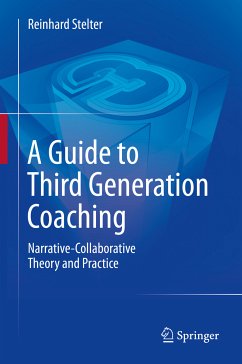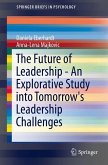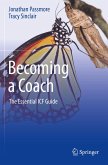A Guide to Third Generation Coaching
Narrative-Collaborative Theory and Practice
Third generation coaching proposes a form of dialogue where coach and coachee are focused on creating space for reflection through collaborative practices and less concerned with fabricating quick solutions. Aspiring to achieve moments of symmetry between coach and coachee, where their dialogue is driven by a strong emphasis on meaning-making, values, aspirations and identity issues. Coach and coachee meet as fellow-humans in a genuine dialogue.
Marking a new trend in coaching, based on the acknowledgement of changes in society, learning and knowledge production, as well as leadership, while distinguishing itself from the existing models (pop coaching, GROW model, etc.). Third generation coaching is based on a fresh analysis of our society - a society that is characterized by diversification, identity challenges, abolition of the monopoly of knowledge, lifelong learning, and the necessity for self-reflection.
Providing quality material to guide ambitious practitioners and high level coaching education programs, in an accessible format. A Guide to Third Generation Coaching advocates a revisited and innovative approach to coaching and coaching psychology, advantageous for learners and practitioners alike, by supporting the reader as a reflective practitioner.
"In this insightful book Reinhard Stelter takes coaching to a new level. With its new perspective, it will make an outstanding contribution to the field."
Prof Stephen Palmer, Centre for Coaching, London, UK, President of the International Society for Coaching Psychology (ISCP)
"This book is a wonderful contribution to further theoretical understanding and evidence-based practice within Coaching and Coaching Psychology. Reinhard provides us with a look at the foundations contributing to this field, the benefit of his experience and learning, and the evolution of thinking to our current state. Whether you are a coach, coaching psychologist, leader, manager or student, you will find this an excellent resource to expand your thinking, reflection, exploration, and learning on your journey."
Diane Brennan, MBA, MCC, Past-President International Coach Federation (ICF) in 2008
"A thoughtful and wide ranging journey through the philosophy of coaching. Professor Stelter brings positive psychology, dialogue, and narrative approaches together into a model of coaching designed to meet the needs of clients in today's world."
Dr. Michael Cavanagh, MClinPsy, PhD, Deputy Director, Coaching Psychology Unit, School of Psychology, The University of Sydney
Dieser Download kann aus rechtlichen Gründen nur mit Rechnungsadresse in A, B, BG, CY, CZ, D, DK, EW, E, FIN, F, GR, HR, H, IRL, I, LT, L, LR, M, NL, PL, P, R, S, SLO, SK ausgeliefert werden.
"There are also many useful practical summaries and applications found in the book for those seeking to learn more about the approach featured in the book. ... I recommend that this book be read for a better understanding of one model of the narrative-collaborative approach to coaching. ... It provides focus on an approach to coaching that has much for coaches and coaching psychologists to consider as to what their purpose is and how best to achieve it." (Rodney L. Lowman, PsycCRITIQUES, Vol. 59 (29), July, 2014)









